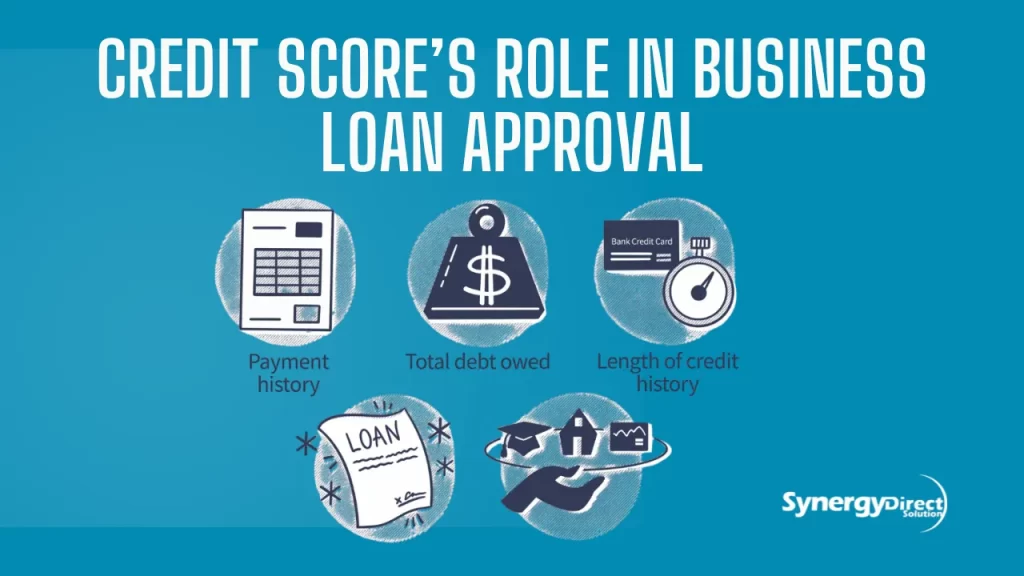Credit Score’s Role in Business Loan Approval: A Comprehensive Guide
In the world of business financing, one of the most important factors that lenders assess before approving a loan is the credit score. Whether you’re a small business owner or leading a large corporation, your credit score plays a crucial role in determining your eligibility for a business loan. In this article, we will dive deep into understanding the importance of credit scores, how they impact business loan applications, and provide valuable insights on improving your credit score for better loan outcomes.

What is a Credit Score?
A credit score is a numerical representation of an individual’s or a business’s creditworthiness. It is calculated based on various factors, including credit history, the amount of debt, and repayment habits. For individuals, credit scores generally range from 300 to 850, while business credit scores are slightly different, ranging from 0 to 100. The higher the score, the more trustworthy the borrower is considered by lenders.
For businesses, credit scores are mainly influenced by:
- Payment history: This includes how timely the business has been in repaying past debts.
- Credit utilization: The proportion of the credit limit that a business uses.
- Length of credit history: A longer credit history often signals financial stability.
- Public records: Bankruptcy, tax liens, or judgments can negatively impact a business’s credit score.
Debt levels: A business with high levels of debt may have a lower credit score.
How Credit Scores Affect Business Loan Applications
When applying for a business loan, lenders typically use credit scores as one of the primary metrics to evaluate the borrower’s creditworthiness. Lenders view credit scores as an indicator of the likelihood that the business will repay the loan on time. Here’s how credit scores impact the business loan process:
1. Loan Approval Chances
- Higher Credit Score: A higher credit score improves your chances of loan approval. A score in the good to excellent range (700 and above) signals that the business is financially responsible and has a history of paying its debts. This will make lenders more willing to approve loans, as the risk of default is perceived to be lower.
- Lower Credit Score: If your business has a lower credit score (below 650), lenders might view your business as risky. As a result, they may reject your loan application or approve the loan at higher interest rates to offset the risk.
2. Interest Rates
Lenders use your credit score to determine the interest rate on your loan. A higher score generally means lower interest rates, which can save your business a significant amount of money over the loan term. On the other hand, if you have a lower credit score, lenders may impose higher interest rates to compensate for the perceived risk.

3. Loan Terms and Conditions
In addition to interest rates, a higher credit score can help you secure more favorable loan terms. These terms could include higher loan amounts, longer repayment periods, or more flexible conditions. Conversely, a lower credit score may result in smaller loan amounts, shorter repayment periods, or stricter terms and conditions, which could limit your business’s ability to grow or handle cash flow challenges.
4. Type of Loan Available
Your credit score can also determine the type of loan you’re eligible for. Businesses with high credit scores may qualify for traditional bank loans, which typically offer low interest rates and flexible repayment terms. Businesses with lower credit scores, however, may need to explore alternative financing options, such as SBA loans, merchant cash advance loans, or lines of credit, which may come with higher interest rates and shorter repayment periods.
Why Does a Credit Score Matter for Business Loans?
A credit score matters significantly for business loans because it acts as a key indicator of the borrower’s financial reliability and repayment behavior. Lenders rely on credit scores to assess the risk associated with lending money to a business.
A strong credit score demonstrates a history of responsible financial management, timely payments, and low debt levels—factors that increase a lender’s confidence in the borrower’s ability to repay the loan. On the other hand, a low credit score signals potential financial instability or past defaults, which can lead to higher interest rates, stricter loan terms, or outright denial of the loan application.
Whether it’s a startup or an established company, a good credit score can be the deciding factor between receiving the capital needed to grow or facing financial roadblocks. Ultimately, a business’s credit score serves as a snapshot of its creditworthiness and plays a critical role in determining not only loan approval but also the quality of the financing received.
Why Is Credit Important to a Business?
Credit is crucial to a business because it enables access to capital, supports growth, and builds financial credibility. Most businesses, whether small startups or large enterprises, face situations where immediate cash flow is insufficient to cover operational costs, purchase inventory, invest in equipment, or expand. In such cases, having good credit allows the business to secure loans, lines of credit, or vendor financing to bridge financial gaps and maintain smooth operations. Additionally, strong business credit helps a company negotiate better terms with suppliers, reduces upfront payment requirements, and enhances its reputation with lenders and investors.
Moreover, credit can be a strategic tool that allows businesses to seize opportunities without disrupting day-to-day operations. For instance, during seasonal spikes or unexpected surges in demand, credit can provide the flexibility needed to scale up quickly. It also plays a key role in separating personal and business finances, particularly for small business owners, which is essential for long-term financial health. In short, good business credit is not just about borrowing money—it’s a foundation for stability, trustworthiness, and sustainable growth.
How to Improve Your Business Credit Score?
Improving your business credit score is essential for securing financing, building vendor relationships, and establishing credibility in the marketplace. Just like personal credit, a business credit score reflects your company’s financial reliability and payment history. The good news is that with consistent financial practices and responsible credit behavior, you can steadily increase your score over time.
Start by checking your business credit reports regularly with agencies like Dun & Bradstreet, Experian Business, and Equifax Business. Look for inaccuracies or outdated information and dispute any errors that could negatively impact your score. This is a foundational step that ensures your credit file reflects your true financial performance. In addition, make sure your business is officially registered and has a separate legal structure (such as an LLC or corporation), along with its own business bank account and tax ID number—this helps establish a distinct credit identity apart from your personal credit.
Next, pay your bills and invoices on time—or early whenever possible. Payment history is one of the most important factors in your business credit score. Vendors and lenders report payment behavior to credit bureaus, so consistently prompt payments demonstrate reliability. If you’re using vendor credit or trade accounts, aim to build a history of responsible use across multiple suppliers.
Also, reduce your credit utilization ratio—that is, keep your balances low relative to your credit limits. Using too much of your available credit can signal financial strain, whereas maintaining a healthy buffer shows financial discipline. It’s also wise to avoid frequent credit inquiries, as too many applications for credit in a short period can temporarily lower your score and indicate risk to lenders.
Another way to boost your score is by working with vendors who report to business credit bureaus. Not all suppliers share payment data, so choose those that do and maintain good relationships with them. Over time, these positive payment records will strengthen your score. Similarly, consider taking out small business loans or lines of credit and repaying them responsibly to build a strong credit history.
Finally, monitor your business credit score over time to track improvements and adjust your strategies as needed. Tools like credit monitoring services can alert you to changes in your report, helping you stay proactive. Improving your business credit score takes time and consistency, but the long-term benefits—better financing options, lower interest rates, and greater financial flexibility—are well worth the effort.

How Far Back Does Credit History Go in a Credit Report?
Credit history in a credit report can go back as far as your oldest active or closed credit account allows, depending on the type of information and the reporting agency’s policies. In most cases, positive credit information—such as loans that were paid on time—can remain on a credit report for up to 10 years from the date the account was closed. This benefits individuals and businesses that have demonstrated responsible borrowing and repayment habits over time.
On the other hand, negative information, like missed payments, charge-offs, or bankruptcies, typically stays on the report for a shorter period—usually 7 years from the date of the delinquency. However, certain severe financial events, such as Chapter 7 bankruptcy, can remain visible for up to 10 years.
For businesses, this credit history includes the age of business credit accounts, any defaults or late payments, and records of financial judgments or liens. Lenders evaluating a business loan application consider the length and quality of this history to gauge the borrower’s long-term credit behavior. Therefore, the longer and more positive your credit history, the more favorable your business looks in the eyes of lenders.
How Can a High Credit Score Benefit a Business When Applying for Financing?
A high credit score offers several powerful advantages to a business when applying for financing, acting as a key that unlocks better borrowing opportunities. Firstly, it increases the likelihood of loan approval, as lenders see high scores as evidence of strong financial management and low default risk. This level of trust can significantly expedite the approval process and give business owners access to a broader range of funding options—from traditional bank loans to lines of credit and equipment financing.
Secondly, businesses with high credit scores often benefit from lower interest rates. Since lenders associate high scores with reduced risk, they reward borrowers by offering more favorable loan terms. This can translate into significant cost savings over time, especially on large loans with longer repayment periods. Additionally, a high credit score may allow a business to negotiate higher loan amounts or longer repayment terms, giving it more financial flexibility and breathing room for investment, expansion, or unexpected expenses.
Furthermore, a strong credit profile enhances a business’s credibility with vendors, investors, and partners, fostering trust and improving relationships across the supply chain. It also helps maintain financial stability during periods of market uncertainty, as creditworthy businesses are more likely to secure emergency funding. Overall, a high credit score not only makes financing more accessible but also more affordable and efficient, giving businesses a competitive edge in growth and sustainability.
What Credit Score Is Needed for a Small Business Loan?
The credit score required for a small business loan varies depending on the lender and the type of financing sought. Traditional banks typically look for a personal credit score of 680 or higher, especially for standard term loans or SBA-backed loans, as this indicates strong financial responsibility and a low risk of default.
However, many alternative lenders and online financing platforms offer more flexibility, approving applicants with credit scores as low as 500–600, though such loans often come with higher interest rates and shorter repayment terms. In addition to personal credit, lenders may also evaluate a business credit score, especially if the business has an established credit profile.
Scores from agencies like Dun & Bradstreet, Experian Business, or Equifax Business are commonly used, and a business credit score of 75 or above is usually seen as favorable. Ultimately, the stronger the credit profile—both personal and business—the better the loan terms and the greater the chances of approval.
Benefits of a Good Business Credit Score
A good business credit score offers a wide range of advantages that can significantly enhance a company’s ability to grow, secure financing, and establish trust with partners. One of the primary benefits is easier access to financing. Lenders are more likely to approve loan and credit applications from businesses with strong credit profiles, often offering larger loan amounts, lower interest rates, and better repayment terms. This reduces the cost of borrowing and improves overall cash flow, which is crucial for managing operations and investing in expansion.
Another major benefit is credibility with vendors and suppliers. A strong business credit score signals financial stability, encouraging suppliers to extend favorable trade credit terms such as net-30 or net-60 payment options. This allows businesses to purchase inventory or services on credit, preserving cash for other needs. Additionally, a positive credit history makes it easier to negotiate better terms or discounts, enhancing profit margins.
A high credit score also helps in separating personal and business finances, especially when businesses apply for credit under the company’s name rather than relying on the owner’s personal credit. This distinction not only protects personal assets but also strengthens the company’s financial identity. Moreover, good credit scores can influence insurance premiums, as many commercial insurers use credit-based data to assess risk and determine pricing.
In the long run, maintaining a strong business credit score builds a company’s reputation in the market, making it more attractive to investors, partners, and clients. Whether it’s winning government contracts, attracting venture capital, or scaling operations, a good credit score is a powerful tool for business growth and long-term success.
Credit Score Role in Business Loan Lead Example
A business credit score plays a critical role in generating business loan leads by helping lenders identify low-risk borrowers who are more likely to repay their loans on time. For instance, consider a small logistics company looking to expand its fleet. If the business owner has a strong personal credit score of 720 and a business credit score above 80, lenders are more inclined to view this borrower as trustworthy and financially responsible.
As a result, this lead is considered “high-quality,” increasing the likelihood of loan approval with favorable terms such as lower interest rates, higher loan amounts, and longer repayment periods. On the contrary, a potential borrower with a credit score below 600 may still qualify for financing, but is flagged as a higher-risk lead—often resulting in limited funding options, higher costs, or rejection.
In this way, credit scores not only determine the outcome of loan applications but also help lenders prioritize and target the most promising leads, streamlining the approval process and reducing financial risk.
Credit Scoring Models Used by Banks
Banks use a variety of credit scoring models to assess the creditworthiness of both individuals and businesses before approving a loan. The most widely used model is the FICO Score, which ranges from 300 to 850 and is based on factors such as payment history, debt levels, length of credit history, credit mix, and new credit inquiries.
Another popular model is the VantageScore, developed by the three major credit bureaus—Experian, Equifax, and TransUnion—which also uses a 300 to 850 range but emphasizes recent credit behavior and trends. For small business financing, especially SBA loans, banks often rely on the FICO Small Business Scoring Service (SBSS), which scores businesses on a scale of 0 to 300 by combining both personal and business credit data.
Additionally, many banks build their own internal scoring models, which include proprietary data such as customer banking behavior, industry risk, and geographic factors. Banks may also refer to business credit scores from agencies like Dun & Bradstreet, Experian Business, and Equifax Business, each offering different scales and insights into a company’s financial health. Together, these models help banks make accurate and risk-aware lending decisions.
Conclusion
In conclusion, your credit score’s role in business loan approval is critical. It affects everything from your ability to secure a loan to the interest rate and terms you receive. By building and maintaining strong credit, businesses not only increase their financing options but also gain a competitive edge through better relationships, financial stability, and long-term growth potential.
FAQS
1. Can I get a business loan with bad credit?
Yes, but options are limited. You may need to use alternative lenders, provide collateral, or accept higher interest rates.
2. Does personal credit affect business loan approval?
Absolutely. Especially for small businesses or startups, lenders often evaluate the owner’s personal credit alongside business credit.
3. How fast can I improve my business credit score?
With consistent effort, improvements can be seen in as little as 3–6 months, though significant changes may take longer.
4. Do all vendors report to business credit bureaus?
No. It’s important to work with vendors who actively report payment activity to boost your score.
5. Is it better to apply for credit under my business or personal name?
Always apply under your business name once it has an established credit profile to protect personal assets and build business credit.
